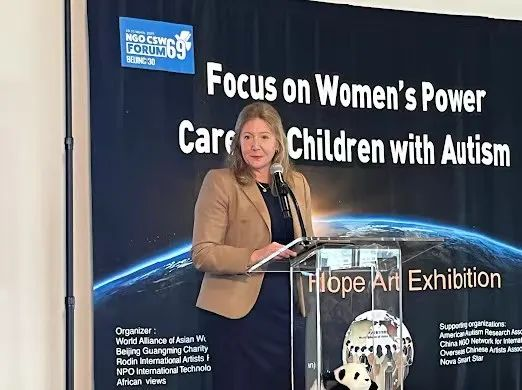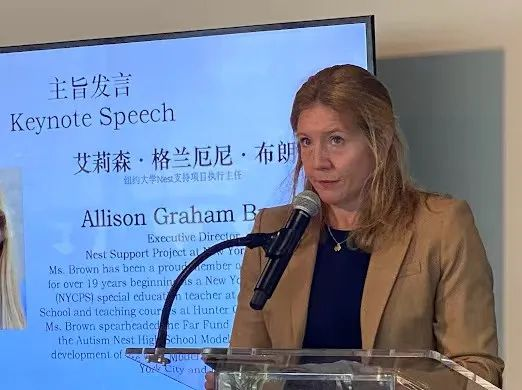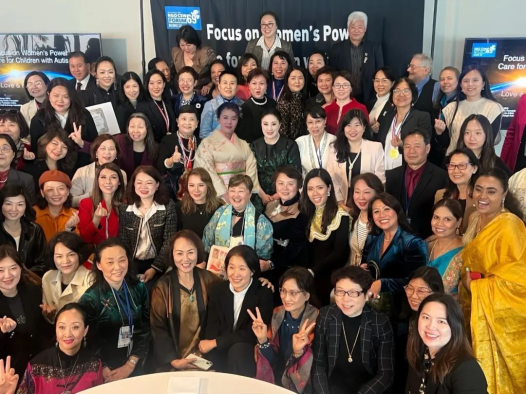2025-04-01 浏览人数:1145次
联合国妇女地位委员会第69届会议于2025年3月10日-21日在纽约联合国总部举行。本届会议聚焦审议《北京宣言》和《行动纲领》的落实进展,旨在推动全球性别平等与妇女赋权事业。
会议期间,特别设置了民间社会论坛环节,邀请全球民间组织举办平行活动,深入探讨妇女地位委员会优先主题,为与会者提供了一个交流与合作的广阔平台。
3月17日由中国民间国际交流促进会指导支持,北京市光明慈善基金会、世界亚裔女性联盟、美国罗丹国际艺术家基金会、日本国际技术交流协会、非洲视野联合主办CSW69平行论坛“关注女性力量、关爱孤独症儿童及‘爱与希望’艺术特展”。纽约大学艾莉森·格兰厄尼·布朗教授主旨演讲内容如下:

Embracing Neurodiversity:The Impact and Evolution of the Nest Model for Inclusive Education
拥抱神经多样性--巢模式对包容性教育的影响和演变
Good afternoon distinguished delegates and esteemed colleagues, It is my distinct honor to speak with you today. I want to thank the Guangming Charity representatives for inviting me to share our work.
尊敬的各位代表和同事们,下午好。今天能与大家交谈,我感到非常荣幸。我要感谢光明慈善代表邀请我分享我们的工作。

I am Allison Graham Brown, and I am the Executive Director of the Nest Support Project at New York University (NYU). The Nest Support Project focuses on autistic care in educational spaces. We developed the Nest Model, which is a collaborative, neurodiversity-affirming, strengths-d model of inclusive education. Our team engages in research, development, training and consultation centered on empowering public-school communities. Our work is directly informed and enhanced by the perspectives of autistic self-advocates, including hiring autistic consultants and full-time employees. We work to create systems change that fosters self-determination in students and to enact our vision of a world that authentically embraces its inherent neurodiversity.
我是艾莉森·格兰厄尼·布朗,我是纽约大学巢支持项目的执行主任。巢支持项目侧重于教育空间的孤独症护理。我们开发了巢模式,这是一种协作的、肯定神经多样性的、基于优势的全纳教育模式。我们的团队致力于以赋权公立学校社区为中心的研究、开发、培训和咨询。我们的工作直接受到孤独症自我倡导者观点的启发和增强,包括聘请孤独症顾问和全职员工。我们致力于创造系统变革,促进学生的自决权,并实现我们对一个真正拥抱其固有神经多样性的世界的愿景。

I would like to share a brief history of our organization to understand where we started and how far we’ve come. In 2000, despite the New York City Public Schools (NYCPS) implementing inclusion for educating many disabled students, the predominant educational placement for autistic students was in separate, restrictive, environments, typically outside of their community. Thus, NYCPS sought a new inclusive approach. They partnered with Dorothy Siegel at NYU and she brought in Dr. Shirley Cohen at Hunter College to lead a committee which designed and piloted two models of in 2003. One model prevailed and the name Nest was ed because it connotes a small, nurturing environment in which autistic students could feel safe and flourish.
我想分享一下我们组织的简史,以了解我们从哪里开始,走了多远。2000年,尽管纽约市公立学校(NYCPS)实施了包容教育,以教育许多残疾学生,但孤独症学生的主要教育安置是在单独的、限制性的环境中,通常是在他们的社区之外。因此,NYCPS寻求一种新的包容性方法。他们与纽约大学的多萝西·西格尔合作,她请来亨特学院的雪莉·科恩博士领导一个委员会,该委员会于2003年设计并试行了两种模式。一种模式占了上风,之所以选择巢这个名字,是因为它意味着一个小的、有教养的环境,在这个环境中,孤独症学生可以感到安全和繁荣。
From the Nest Model, the NYCPS created the Autism Nest program which, from inception, demonstrated tremendous success and family satisfaction leading to scaling across the largest school system in the United States. The NYCPS has continued to partner with our team. In 2006, we developed a Nest Model for secondary schools, keeping the foundational elements but adapting the training and practices to account for the changing needs of adolescents. The Nest program scaled and sustained, currently in 88 schools serving over 2,155 autistic students learning alongside 7,195 of their non-autistic peers in kindergarten through 12th grade, making it the largest comprehensive inclusion program in the United States.
从巢模式开始,NYCPS创建了孤独症巢计划,该计划从一开始就取得了巨大的成功和家庭满意度,从而在美国最大的学校系统中扩大了规模。NYCPS继续与我们的团队合作。2006年,我们为中学开发了一个巢模式,保留了基本要素,但调整了培训和实践,以适应青少年不断变化的需求。巢项目持续扩大,目前在88所学校为2155多名孤独症学生提供服务,这些学生在幼儿园到12年级与7195名非孤独症同龄人一起学习,使其成为美国最大的综合包容项目。
The Nest Program currently has a four-year high school graduation rate of over 97%, an astounding 30 percentage points higher than the city-wide graduation rate for special education students (2024). In addition, Nest students are more than three times as likely to score proficient on NY State ELA and Math exams and have consistently higher attendance than other autistic students in NYCPS.
巢计划目前的四年制高中毕业率超过97%,比全市特殊教育学生的毕业率(2024年)高出30个百分点。此外,巢学生在纽约州ELA和数学考试中取得优异成绩的可能性是其他孤独症学生的三倍多,并且出勤率始终高于纽约州儿童保护中心的其他孤独症患者。
Beyond New York we are grateful to expand our reach and partner with international organizations looking to better understand neurodiversity and how to cultivate inclusive spaces. Our partnerships include organizations such as the Specialisterne Pre-employment Program (2018), United Arab Emirates Education Ambassadors (2018), andNASA’s Neurodiversity Summer Internship Program (2022). Additionally, in 2015 Aarhus, Denmark approached us to partner. Across five years our team collaborated with key stakeholders, to adapt our Nest model to honor the Danish culture and establish an inclusion model for autistic students within the Denmark school system. The Nest-inspired model has been so successful that Denmark uses it to support students with other disabilities and has spread the model across their country.
在纽约之外,我们很感激能够扩大我们的影响力,并与希望更好地了解神经多样性以及如何培养包容性空间的国际组织合作。我们的合作伙伴包括专业职前计划(2018)、阿拉伯联合酋长国教育大使(2018)和美国国家航空航天局神经多样性暑期实习计划(2022年)。此外,2015年,丹麦奥胡斯与我们建立了合作关系。在五年的时间里,我们的团队与主要利益相关者合作,调整我们的巢模式,以尊重丹麦文化,并在丹麦学校系统内为孤独症学生建立包容模式。巢启发的模式非常成功,丹麦用它来支持其他残疾学生,并在全国范围内推广了这一模式。
When reflecting on autism care and how to chart our collective future, I thought it important to elevate three specific elements from our Nest Model. These key elements are, establishing a shared philosophy that neurodiversity is beautiful, necessary, and strengthens our world, second, providing comprehensive training and ongoing support to educators, and third, centering the expertise and experiences of autistic individuals to inform our work.
在思考孤独症护理以及如何规划我们的集体未来时,我认为从我们的巢模型中提升三个具体要素很重要。这些关键要素是,建立一种共同的理念,即神经多样性是美丽的、必要的,并加强我们的世界,第二,为教育工作者提供全面的培训和持续的支持,第三,以孤独症患者的专业知识和经验为中心,为我们的工作提供信息。
First, we must establish a shared neurodiversity-affirming philosophical foundation. Despite advances, at its core the education system tends to perpetuate ableism, not appreciating disabled learners for who they are but instead with a harmful approach of remediating deficits and working to change the disabled child to fit a neurotypical world.
首先,我们必须建立一个共同的神经多样性肯定的哲学基础。尽管取得了进步,但教育系统的核心往往是延续能力主义,不欣赏残疾学习者的身份,而是采取有害的方法来弥补缺陷,努力改变残疾儿童,使其适应神经典型的世界。
Our Nest Model counters this approach. We do not believe in changing the autistic students but instead changing the environment, language, and instruction to create accessible spaces in which all learners can thrive. As part of this philosophical approach, we utilize a strength-d paradigm. Dr. Kristie Patten, our principal investigator and a Professor in the Department of Occupational Therapy at NYU, found in her scoping review that strength-d interventions were related to positive social engagement, learning, self-advocacy, and anxiety reduction (Murthi, 2023). Her findings deepen our commitment to using a strength-d approach to support learning in the classroom.
我们的巢模式反对这种方法。我们不相信改变改变症学生,而是改变环境、语言和教学,创造所有学习者都能茁壮成长的无障碍空间。作为这种哲学方法的一部分,我们利用了一种基于力量的范式。我们的首席研究员、纽约大学职业治疗系教授Kristie Patten博士在她的范围界定综述中发现,基于力量的干预措施与积极的社会参与、学习、自我宣传和减少焦虑有关(Murthi,2023)。她的发现加深了我们对使用基于力量的方法来支持课堂学习的承诺。
Second, while it has been well established that inclusion is significantly beneficial for educating both disabled and nondisabled peers, it is often not successful in practice due to the lack of training and consistent support for educators. In response, we developed a training methodology to create a paradigm shift to an understanding of, and appreciation for, neurodiversity, and the recognition that inclusion is not a place, but a mindset.
其次,虽然人们已经很好地确定,包容对教育残疾和非残疾同龄人都有很大的好处,但由于缺乏对教育工作者的培训和持续支持,它在实践中往往不成功。作为回应,我们开发了一种培训方法,以实现对神经多样性的理解和欣赏的范式转变,并认识到包容不是一个地方,而是一种心态。
Our approach to training has been proven effective by both the fidelity of the Nest program and through research. In 2022, The Research Alliance for New York City Schools conducted a qualitative study (N=29) aimed at understanding educators’ experiences in the Nest program (Fanscali C Almash 2022). Respondents unanimously reported that the training courses were useful in preparing them to implement the Nest model. Moreover, when asked about the benefits of the Nest program to the larger school community, teachers and administrators said the overall school culture was more kind and supportive for both students and staff and that educators used language focused on positives rather than deficits. Nest trainings changes mindset around disability, empowering educators to move from theory to practice, and enabling authentic inclusion to be realized.
巢项目的忠诚度和研究证明,我们的培训方法是有效的。2022年,纽约市学校研究联盟进行了一项定性研究(N=29),旨在了解教育工作者在巢项目中的经验(Fanscali C Almash 2022)。受访者一致表示,培训课程有助于他们为实施巢模式做好准备。此外,当被问及巢项目对更大的学校社区的好处时,教师和管理人员表示,整体学校文化对学生和教职员工都更加友善和支持,教育工作者使用的语言侧重于积极的一面,而不是缺陷。巢培训改变了人们对残疾的看法,使教育工作者能够从理论转向实践,并实现真正的包容。
Third and finally, we must center the lived experience of autistic individuals. The Nest model has continued to evolve to account for changes in the field, advances in research, lessons learned from implementation, and most importantly, expertise from the autistic advocate community. We take to heart the motto “Nothing about us without us”.
第三,也是最后一点,我们必须以孤独症患者的生活体验为中心。巢模式不断发展,以适应该领域的变化、研究的进步、从实施中吸取的经验教训,最重要的是,孤独症倡导者社区的专业知识。我们牢记“没有我们,就没有我们”的座右铭。
Recently, we ran focus groups of graduates of the Nest program to gather insight and recommendations. Overwhelming, the feedback was that the crucial component that impacts their quality of life is feeling included and being able to show up as their authentic self. Being able to show up as your authentic self…it sounds so simple, yet is so profound. This sentiment inspired s to our trainings ensuring that we not only focus on celebrating autistic culture but also on recognizing and addressing ableism to nurture authentic belonging.
最近,我们组织了巢项目毕业生焦点小组,以收集见解和建议。压倒性的反馈是,影响他们生活质量的关键因素是感觉被包容,并能够表现出真实的自我。能够表现出真实的自我……这听起来很简单,但却很深刻。这种情绪激发了我们对培训的更新,确保我们不仅关注庆祝孤独症文化,而且关注识别和解决能力歧视问题,以培养真正的归属感。
We are incredibly proud of the impact we have made in the past 22 years. While our innovative model is at the forefront of the field and an exemplar for inclusive education, we remain committed to continuing to learn and grow to ensure we provide the best educational care for the autistic community we serve. We can’t wait to see what the next twenty years will bring! Thank you.
我们为过去22年所取得的影响感到无比自豪。虽然我们的创新模式处于该领域的前沿,是全纳教育的典范,但我们仍然致力于继续学习和成长,以确保我们为所服务的孤独症社区提供最好的教育护理。我们迫不及待地想看看未来二十年会带来什么!非常感谢。
